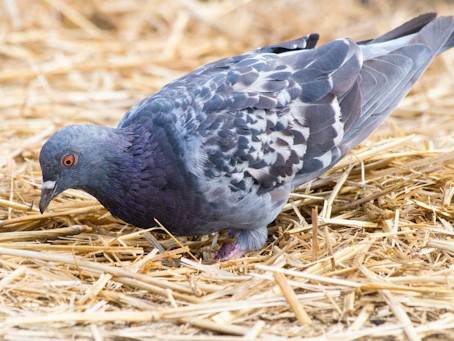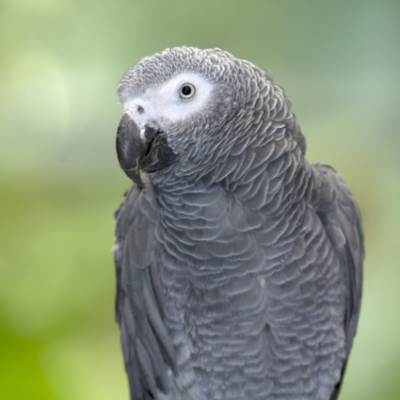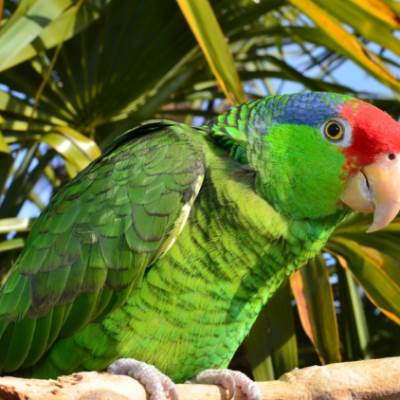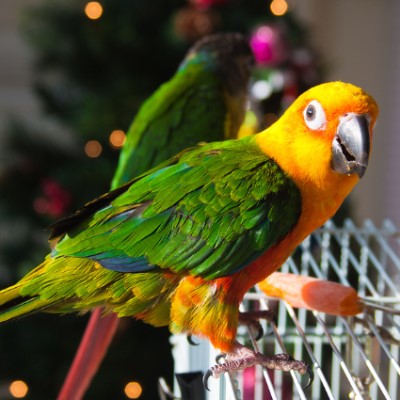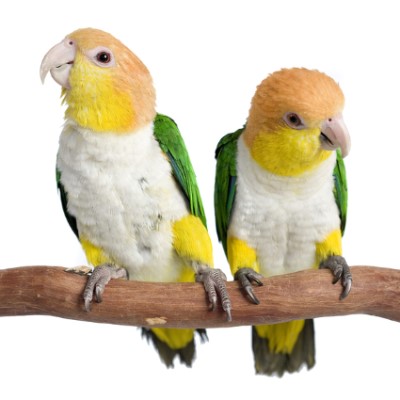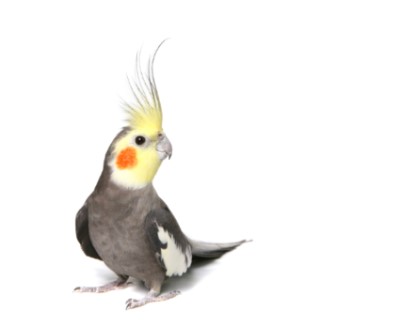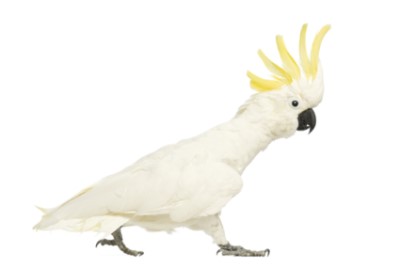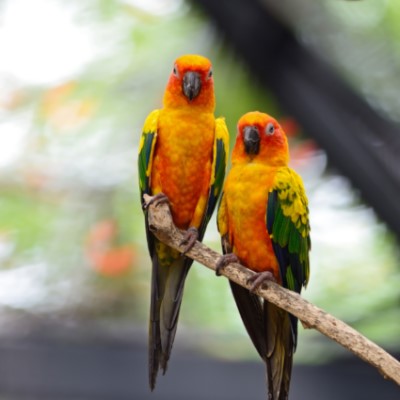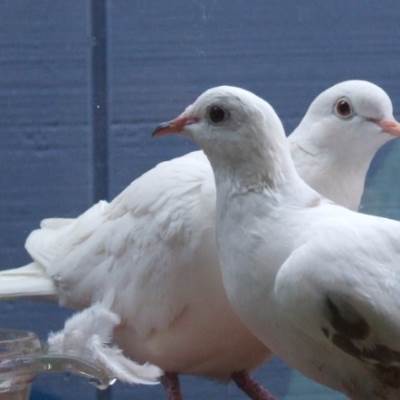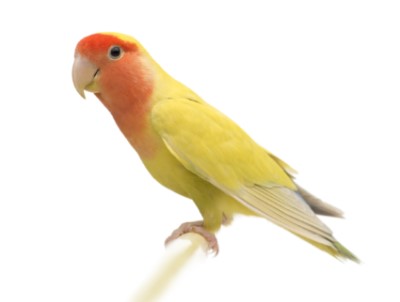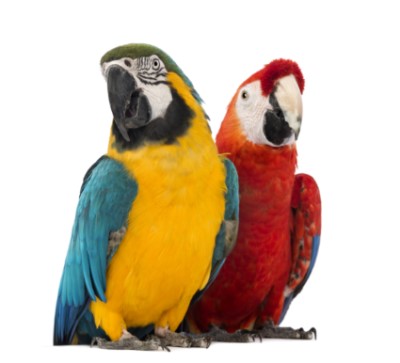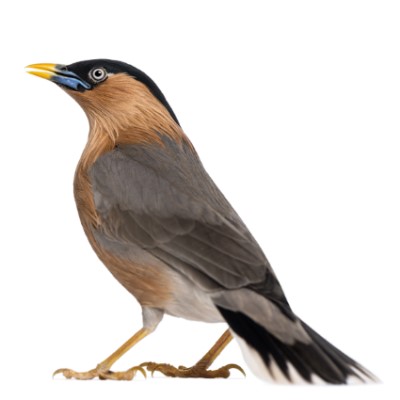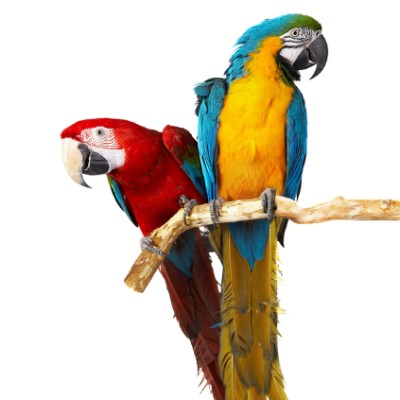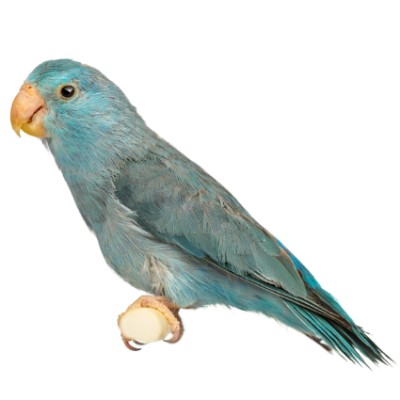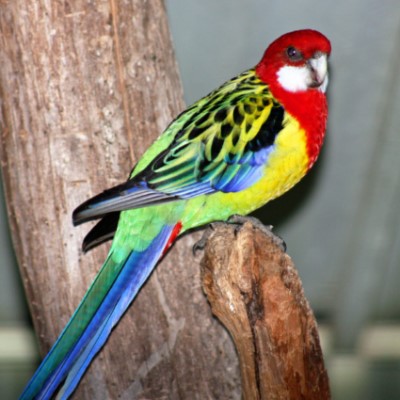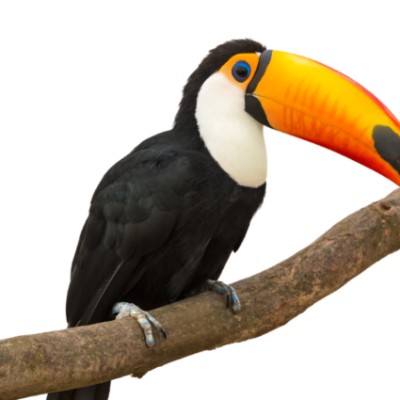There are more than 300 kinds of pigeons and doves all over the world. Most pigeons are “feral” pigeons (feral pigeons are pictured at right), meaning they are birds that live in the wild and are meant to remain in their natural habitat. There are other pigeons that are adopted as pets and those pigeons were either captured or bred in captivity.
There are three groups of beautiful domesticated pigeons that are available for adoption through rescues:
Sporting Pigeons—These are the racers such as the Persian, High Flyers, Rollers, Homing Pigeons, and Tumblers that are domesticated by humans and then used in competitive games or released at wedding or funeral ceremonies. The losers of the competitive games are usually picked off by a hawk or fox or collapse from exhaustion trying to find their way back to their owners. The pigeons released at formal ceremonies are usually white and their color makes them easy prey. Worse, these pigeons are domesticated, and do not have the skills to survive in the wild.
Ornamental or Fancy—These are the pigeons, such as the Ornamental Fantail Pigeon (right) that are bred to take to shows or simply to show off to friends. An Ornamental or Fancy pigeon will require specialized care depending on their species. It is impossible to generalize individual care for this breed because each bird is so different, so be sure to ask the rescuer or breeder for specific information on this pigeon’s day to day care. Ornamentals usually have feathers sticking out of their feet or sides. If bred for shows, this pigeon will cost a lot more money than the Sporting or Utility Pigeons.
Utility—These large pigeons are bred and used for meat, lab testing, to train hunting dogs, or put in traps and shot by hunters when released for sport. These pigeons actually make wonderful pets.
Common Reasons for Surrender
Pigeons are most often surrendered because they are hurt, lost and found, or are removed from a ledge outside a hotel room or a beam in a warehouse or department store.
Pros
Pigeons are quiet. They get along with one another (male and female), and they don’t chew up your walls or furniture like a parrot can. They enjoy leisurely naps, sunbathing, water bathing, and they even like to flirt. Probably the most important thing about the pigeon is that they are home bodies. They love to be home with their mates and babies and no matter how far away they fly, they will do all they can to find their way back home. Still, as a domesticated bird the pigeon has needs. They especially need a companion bird, an owner that wants to be their friend, a large cage, and time in and out of that cage.
Pigeons have great interpersonal skills, and they won’t turn your home upside down while becoming your friend. They adapt to their family and even have the ability to figure out the family’s routine. Although the pigeon does not mimic words, she can coo, grunt, and vocalize. A pigeon is known to recognize herself in a mirror, a talent exclusive to elephants, dolphins, chimpanzees, and African Grey Parrots. They are extremely loyal to their mates and to their owners.
Cons
Pigeons poop a lot so you have to develop a strategy to cope with that. The good news is that pigeons eat only grains, veggies, and fruits, and their feces do not smell or stain. Humans have even developed “pigeon pants” that act as a diaper when the pigeon is in flight within the house. Because of the overpopulation of pigeons, there are many pigeons to find homes for and some rescues require that adopting families do not breed the pigeons they adopt. Every five weeks a pigeon that has a mate will lay a pair of eggs, so some rescuers will steal those two eggs and replace them with fake eggs. You can purchase fake eggs at a pigeon supply store.
Diet
A pigeon is to be fed a little less than a quarter of a cup of pigeon feed once per day. That should supply your bird with enough food all day so that by dusk the food is gone. If there is still food in the container the next morning, you can assume the pigeon is being overfed, and you need to cut down on the amount you give every day.
Exercise
Pigeons like to be out of the cage once a day, even if the cages are large enough for the birds to flap their wings. While exercise is great, it is also the time when accidents occur. Pigeons enjoy the floor, so they’re easily stepped on by accident. Also, people fall asleep on the couch with the bird beside them and accidentally roll over and smother their pigeons.
Possible Health Issues
Pigeons are very hardy. Wood smoke and fumes from cooking on Teflon pans is deadly for any bird because avian respiratory systems cannot tolerate fumes and toxins.
If your pigeon has broken skin, it can look like it is healing on the outside when it’s actually infected on the inside. Broken skin on a pigeon needs expert avian care.
Be mindful that you can’t put your Pigeon on your shoulder on the patio even if her wings are clipped. If she is startled, she will take off and get lift, and you may never see your bird again.
Housing
Pigeons’ natural habitats are ledges, not trees, so they enjoy a cage that has a shelf where they perch like they would on a cliff or the ledge of a window sill. Pigeons need a horizontal cage, at least 5 ½ to six feet long per pair of pigeons. Some people have used an extra large dog crate as a pigeon home, which can work well. Be sure the bars are set apart 1 ½ inches or less. Pigeons are ground foragers and will want to peck their food and water from the ground. Place two heavy crock bowls (such as a bowl or use the bottom of a flower pot) on the bottom of the cage. Fill one with feed and the other with shallow water for drinking and bathing. You may purchase cage liners and place a stack of them at the bottom of the cage. Every morning, pull the top liner off and crumble it carefully and throw it away—you will have a brand new one underneath.
Grooming
They love to bathe and they love sunlight. Most people don’t know that birds are dependent on an avian-safe full-spectrum light bulb. When your bird cannot be outside and exposed to natural sunlight, the ultraviolet ray from a full-spectrum light bulb will keep her in good health. Warning—a pet store light bulb that is labeled “Avian Light” may be deadly or blinding to a pigeon. After set up, these are low maintenance birds and very rarely need nails trimmed.
Training
A carrier Pigeon (or homing pigeon such as these mates pictured, right) is actually a racing pigeon that had something strapped to her leg. Pigeons will instinctively go home, but if they are carried miles away from home and released, they may not find their way and may perish in their flight home. Unfortunately, some pigeons lose their homing instinct due to breeding by humans. Unless you’re prepared to create a professional quality pigeon loft that has certain features that birds can get in through to come home but predators can’t, they shouldn’t be free flown.
Some owners have had great success in potty training their pigeons.
Entertainment
They love to sunbathe, water bathe, flirt, strut, preen themselves, and cuddle with their mate.
|
|
We want to thank of MickaCoo Pigeon and Dove Rescue in San Francisco, California, for help with this profile.
